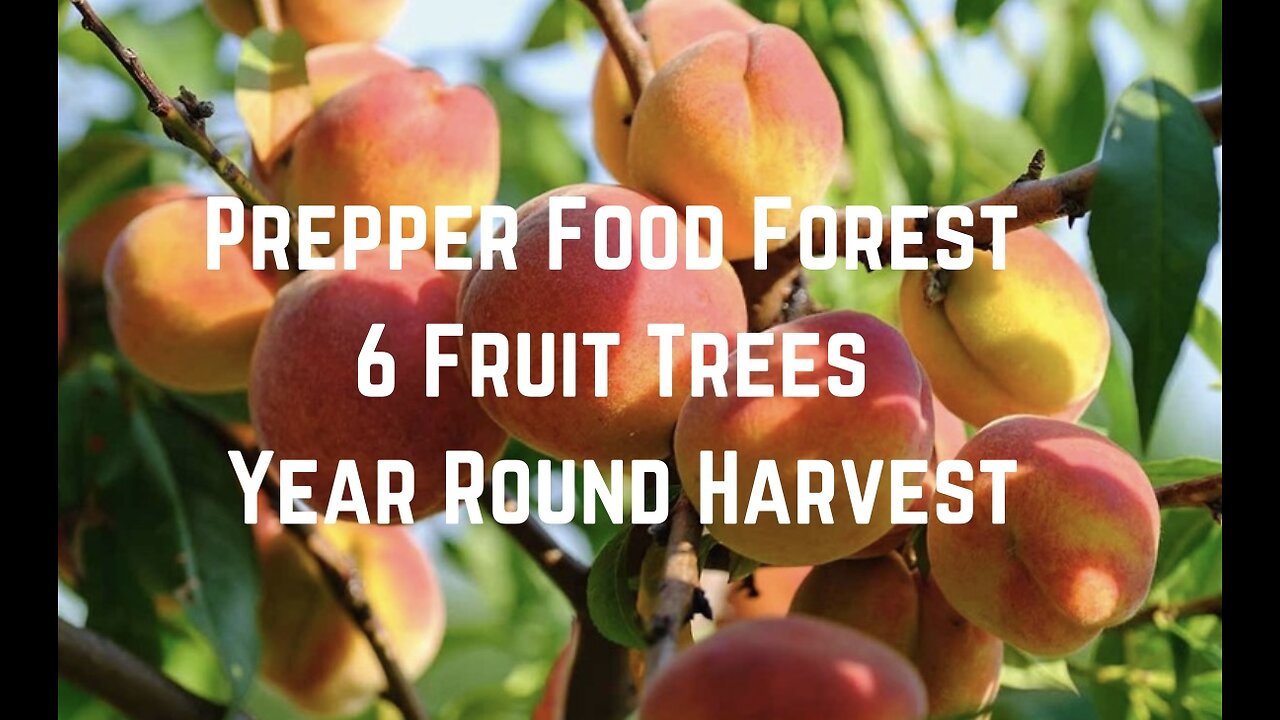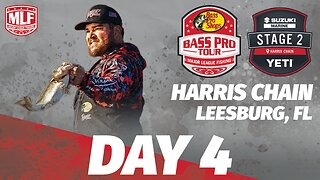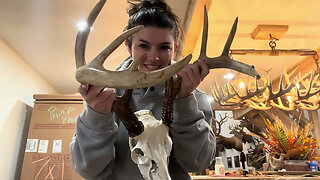Premium Only Content

Prepper Food Forest: 6 Fruit Trees Year Round Harvest
Prepper Food Forest & Perennials
A Food Forest or forest gardening is a low-maintenance, sustainable, plant-based food production system based on woodland ecosystems, incorporating perennial vegetables, fruits, nuts, and herbs.
For a prepper, a food forest can augment ones primary stored food supply located at ones bug out location or residence. It is advantageous to have planted a food forest before a collapse of society. If the plants are spaced out far enough, they can blend in with natural environment for camouflage factor.
A perennial is a plant that comes back year after year. This differentiates it from annuals, which must be planted each year, and biennials, which only live for two years. Just plant your garden or orchard once, and your plantings should last for several years, maybe even several decades.
While all plants listed below are perennials, they may not grow perennially in all locations. In your local climate, plants that come back year after year may not be able to survive over a more extreme winter or summer. Research and check for compatibility with your region before you buy anything by referring to the USDA hardiness zones listed on the seed or plant's label.
Perennial Vegetables
Artichoke (Try Jerusalem, also known as Sunchokes.) Arugula (Type Specific), Asparagus (Keep the bed weed-free, and they'll produce for 20 years or more. You can take your first harvest in the third growing season.) Broccoli (Not all varieties are perennial. Try varieties Nine Star or Purple Cape.) Collard (Type Specific), Dandelion, Kale (Type Specific), Lovage, Onion (Try potato onions, shallots, Egyptian onions, Japanese bunching onions, Welsh onions, and Chinese leeks.), Radicchio, Rhubarb, Sorrel, Spinach (Not all varieties are perennial. Try varieties Ceylon, Sissoo, or New Zealand.) Sweet Potato, Tree cabbages/tree collards, Watercress, Wasabi, Yacon, Yam.
Perennial Fruits
Apple, Asian Pear, Apricot, Avocado, Blackberry, Blueberry, Cherry, Currant, Date, Fig, Goji Berry, Gooseberry, Grape, Honeyberry, Huckleberry, Kiwi, Lemon (Must be brought indoors in the winter in colder climates.) Lime, Mulberry, Nectarine, Olive, Orange (Must be brought indoors in the winter in colder climates.), Paw Paw, Peach, Pear, Persimmon, Plum, Pomegranate, Raspberry, Strawberry (Replant every three years to maintain vigor and cut down on disease.)
Perennial Nuts
Almond, Chestnut, Hazelnut, Macadamia, Pecan, Pistachio, Walnut.
Perennial Herbs
Basil (Not all basil is perennial. Try African Blue or East Indian for a perennial variety.), Chamomile, Chia (Seeds Food Source), Chives, Echinacea, Fennel, Garlic, Ginger, Green Tea, Horseradish, Lavender (It often takes several seasons to establish.) Lemon Balm, Mint, Oregano, Parsley, Rosemary (It can be difficult to grow in some zones.) Sage, Thyme, Turmeric.
Prepper Information Guide PDF
https://acrobat.adobe.com/id/urn:aaid:sc:US:b46cb4da-4978-414f-ad65-fdf4dab21c24
-
 LIVE
LIVE
TonYGaMinG
5 hours ago🟢LIVE NOW! KINGDOM COME DELIVERANCE 2 / NEW EMOTES / BLERPS #RumbleGaming
1,336 watching -
 40:17
40:17
SLS - Street League Skateboarding
4 days agoEVERY 9 CLUB IN FLORIDA! Looking back at SLS Jacksonville 2021 & 2022 - Yuto, Jagger, Sora & more...
48K1 -
 2:00:47
2:00:47
PaddysParlorGames
14 hours agoSunday Parlor Chill: GOBSTEIN
27.3K2 -
 LIVE
LIVE
Major League Fishing
4 days agoLIVE! - Bass Pro Tour: Stage 2 - Day 4
674 watching -
 56:24
56:24
Russell Brand
1 day agoEddie Gallagher: War, Betrayal & Fighting the System
97.4K11 -
 11:21
11:21
TimcastIRL
6 hours agoGOP Rep Says TWO SHOOTERS In JFK Assassination As FBI Uncovers TROVE Of Secret Documents
106K145 -
 1:04:55
1:04:55
Bare Knuckle Fighting Championship
4 days agoBKFC ITALY PRESS CONFERENCE | LIVE!
54.8K6 -
 10:04
10:04
Space Ice
4 hours agoThe Movie Silent Hill Is Like Resident Evil Without The Good Parts - Worst Movie Ever
31.3K10 -
 5:49
5:49
Hannah Barron
1 day agoRedneck Euro Mount
26.1K20 -
 32:34
32:34
hickok45
9 hours agoSunday Shoot-a-Round # 268
20.2K13